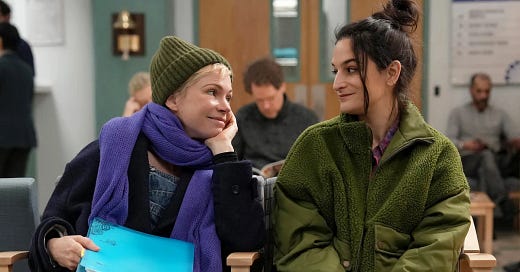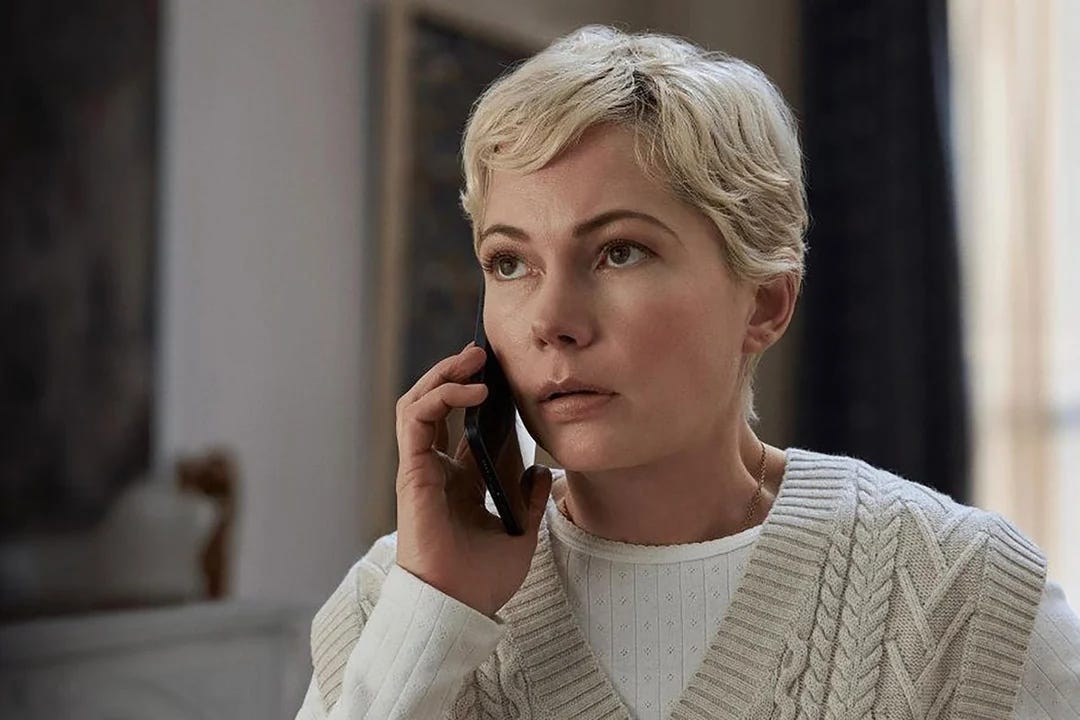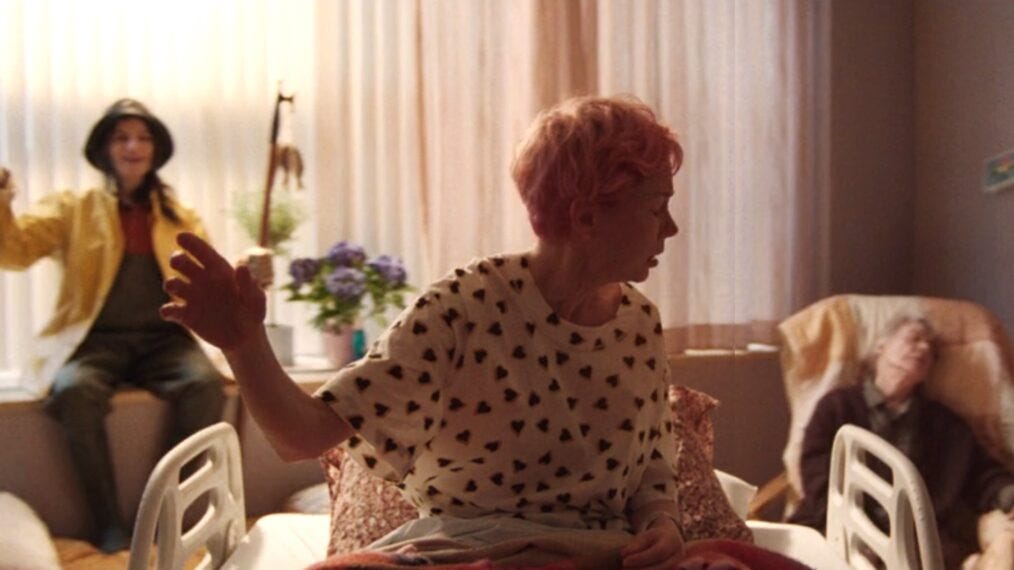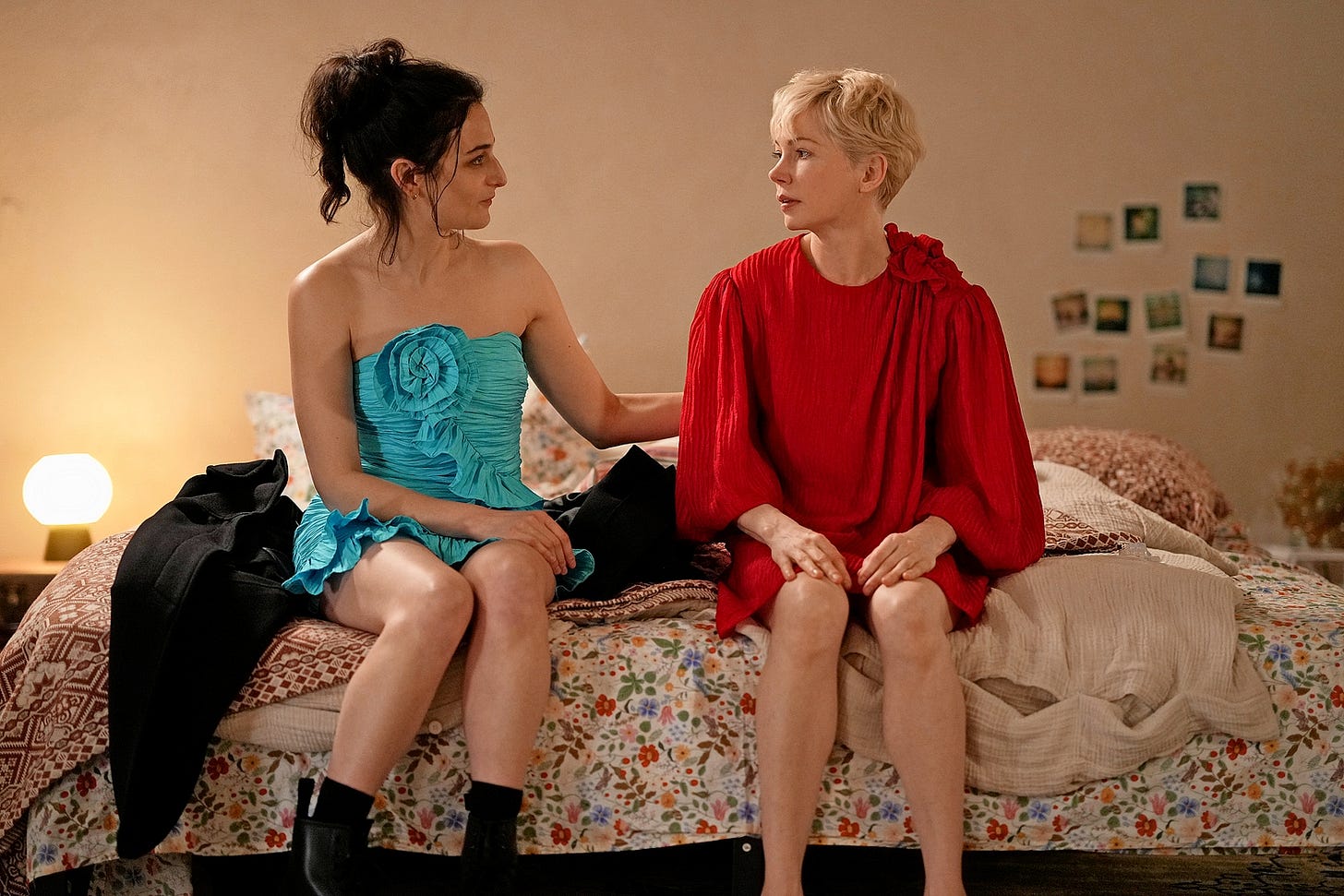Want to dance?
Talking sex through the vehicle of the TV mini series "Dying for Sex". It's a personal one. Spoilers ahead.
It was near the end of our couples therapy session and I could feel hope expiring with every passing minute. My face hot with tears.
I’m tired of crying about sex.
I looked at Nick. We’re both hungry for more.
If sex is a dance, is god the villain for setting up such asinine choreography or am I, the one who can’t let it go?
Ten years ago my sister-in-law was helping me change into my “going away” dress after the reception had simmered to an end. People were lining up around the side of the house to say goodbye and I looked at her, desperate to delay my departure to Grand America. I knelt over an altar earlier that morning but the real sacrifice was still to come; and I was terrified.
Our honeymoon was a disaster from start to very little finishes. It involved looking up illustrated graphics, a doctor’s visit and lots of recalibrating moments of regret. How did we get here? We had sacrificed a lot on behalf of purity culture, and it was now in our wedding chamber where we finally sized up on how high a price we had paid.
The carnage was catastrophic.
In the opening scene of Dying for Sex, Molly sat in her therapy session daydreaming about a guy who went down on her in her 20’s. Shy of climaxing, it was the best she’d ever felt with another person. A phone call interrupted her couples counseling—the cancer had metastasized in her bones and is now terminal. She ran out of the session to the nearest bodega where her friend Nikki met her outside, “I don’t want to die without ever feeling that way again” referencing this faint oral memory.
Having never orgasmed with her husband of ten years or any partner for that matter, Molly’s dying wish was to have a taste of this sexual pleasure before it was too late. I didn’t know much going into this eight-episode Hulu series, nor that it was inspired by a real-life podcast between friends, but it’s hard to explain the viscerality of emotions that it stirred for me.
“Kick me in the dick,” Steven demanded.
After a quick knock to the junk, Molly landed in a heap on the ground, crying from pain. Turns out her escapades of humiliating her neighbor’s dick ended in a fractured femur—the cancer had spread and so had her shame. In the hospital, Molly was reconciling why she couldn’t be more “normal” in the sex department to which Sonya, her Black, queer palliative care social worker, educated:
“You think sex is just penetration and orgasms. Why? Because that’s what Samantha said…sex is a wave. Sex, sex is a mindset. Sex is the nonlinear emergent phenomenon that arises when two or more beings, they touch energy fields. Here’s the thing about your body, you have to listen to it. Yes, maybe it’s saying something that you don’t want and you don’t understand, but give it a chance and listen to it. Both of you.”
For many mormon women who measured sex in hemlines, hand placements and penetration, this kind of expansive, queer-coded pleasure is not readily available or even believable—speaking for myself.
Last week, Amy Allebest and Celeste Davis posted a youtube video on why so many straight married women do not enjoy sex. From a lack of education to being lubed by male supremacy dogma, our environment isn’t exactly ripe for this “nonlinear emergent phenomenon” that Sonya describes. According to Gerder Lerner, “If you want to understand a culture’s gender roles, you first have to understand their creation story.” Amy recounts our story: Adam, the protagonist who cannot be alone. And, Eve—the helpmeet— who was created by him for him. Eve, disobediently, ate the forbidden fruit and managed to invite all evil into the world. Her, and subsequently our, punishment for time and all eternity: “subjugation to men”.
Subjugation to men.
I feel it when I plan my day around his schedule. When I ask about finances. When I have sex. Helpmeet. Help-meet. Help—me. Nick is the kindest, most loving man I’ve ever met—yet, like Adam, his existence feels essential to my purpose. I’ve found it rather difficult to separate servitude to him as a person and that of the patriarchy that emboldened our container of marriage which has led me to crave autonomy and separateness in my eroticism.
Celeste brought up this quote from Esther Perel that feels like a real ‘tdlr’ on therapy right now:
“You saying no to sex is actually you saying no to patriarchy, because those things are inseparable in your mind. You need to separate patriarchy from sex. Sex is not just for men. Sex is for you.”
C. Jane Kendrick was the first person I heard call the LDS church a sex cult. It felt jarring to me at the time. I knew our founding fathers had taken sexual liberties of their own, but I didn’t fully understand the broader sexual implications, until now. By controlling the narrative around sex— it’s expression, utility, acceptability, and practice—we’ve essentially handed prophets by way of purity culture the precision of a surgical knife to mutilate our self-trust beyond recognition. Not only are our bodies never to be trusted, but we ourselves become the actual villains. And what better way to control a congregation than to instill a fear we cannot outrun.
I think it’s telling that almost all of Molly’s sexual mentors are gender expansive, marginalized friends. Which makes sense to me because the antithesis of this adam-ondi-oooh-man penetration games is a sex that is creative, fluid and devoid of shame. A sex that is queer. Kate Mower, a friend who has always been quick to connect sexual liberation to queer literature and academia, detailed how difficult it was to watch Molly’s entitlement in a few of these LGBTQIA sacred spaces.
“I’m here to submit sexually to you” Molly announced as she walked into G’s workplace at Bed, Bath, and Beyond. On their IG stories, Kate described how pervasive this dynamic is especially in the mormon-affiliated spaces. Cis-het women exploiting the emotional labor from a people they once adorned with a scarlet letter to only turn around and discover that “A” is actually an antidote to breaking free from the patriarchal sex that has us all bound. It’s often a cruel game of reclamation for everyone, but especially if straight folks aren’t more accountable in these post-religious sheets.
Truthfully, I owe so much of what progress I have made in the self-exploration department to friends who have taken the prescribed boxes of gender, marriage and sexuality and SMASHED it with the golden mallet it deserves. These late night chats around my tiny electric lamp have been healing—and uncoincidentally, queerness was ALWAYS in abundance.
In terms of sex, I think my favorite dialogue of the season was between Molly and G on a plastic-covered mattress where G educated Molly about topping:
“Vanilla sex you can disappear, right? You can fake it, who cares? This shit, you can’t disappear. Especially, if you’re in control.”
Immediately, I whipped out my notes app and typed…vanilla sex you can disappear.
Disappear. Hide. Disassociate. This feels familiar….
“Stay right here” G says as they hold Molly’s face.
This isn’t to villainize vanilla sex. Missionary position reigns supreme, in my opinion. I just keep questioning—have I actually disappeared in my rather sexually vanilla ways or am I wanting to be invisible? I see the mormon montage now: the chewed gum lessons; the shrinking and deferring; the covering and tucking and pulling of every micromanaged layer; the nights spent on my knees praying away every bad thought, every thought, me. Not only have I scrubbed any feeling of being desirable, but I might’ve scrubbed myself entirely from the erotic narrative at large. We talk about the need to flip the switch on the good-girl syndrome, but where do we hang our invisibility cloak that had us all hiding and playing small to stay safe for the last few decades?
Molly was transferred to hospice in her final stretch of life. “I wanna feel everything for as long as I can,” Molly said in response to the idea of sedation. Her death doula came to recalibrate expectations:
“Death is not a mystery. It’s not a medical disaster. It’s a bodily process. like giving birth, going to the bathroom or coughing, having an orgasm. Your body knows what to do. Your body knows how to die.”
I’ve never seen death romanticized in such a digestible way before and this episode was quite breathtaking to watch (and rewatch). While the dick with wings and floating picture frames and confetti canons were euphoric, it was the rally dance with her mom that had me crying the hardest. In regards to abuse, these two have overcome a lot, separately, but in these final moments they were able to hold each other in their opposing pain. Especially tugging, were the quick snapshots of her seven-year-old self sitting on or near the bed. Little Molly appeared a lot in this last episode so as to say we just carry all of these iterations of ourselves and our grief until the final moment when our labored inhale is no longer followed by an exhale.
These final moments with death are where the geode of the season opens up to reveal the true beauty of this entire dick-dinging process: friendship. This was the pleasure of the season all along….watching Nikki curse out the bodega guy and perform Midsommer Nights Dream at Molly’s bedside and buy dance dresses for their NYE party and squeal, “It happened? Oh, my God, I’m so happy, I’m gonna cum, I swear….you should have called me right when it happened.” Molly had her first (and last) orgasm with sweet, precious neighbor guy “fountain, fountain” and it was Nikki who was there to relish in the victory.
Nikki’s friendship held Molly’s abuse, sexual grief, parental repair, and kinky escapades with such gentleness (an neutrality) that I experienced secondhand healing in her mere parasocial presence. Their friendship is soft, irreverent and playful. In a weird inside-out-kind-of way, I ache to have this type of friendship with my own body and sexuality. It sure feels a lot less punishing than the one I know.
“I think I’m ready”, Molly said as she laid in the birth pool of water. The pain had intensified and it felt like the right time to surrender to relief. Before making it to the bed, Molly says,
“My body did a really good job. It did so good.”
In this simple yet radical self-acceptance, I felt a pang of regret. How could I forget how hard my body fought to keep me safe in the only way it knew? While I’m not entirely sure how to get off this sexual altar, surrendering to my body’s enemies-to-friend pipeline feels like the best place to start.
Oh, maybe get some new choreography.










"By controlling the narrative around sex— it’s expression, utility, acceptability, and practice—we’ve essentially handed prophets by way of purity culture the precision of a surgical knife to mutilate our self-trust beyond recognition." 👏🏼👏🏼👏🏼 Wow, excellent piece. Thank you for sharing!
I don’t often feel that media at large tells a story that myself and the people in my life relate to but this series was so spot on. And your essay on it? *chef’s kiss* The ex mormon cherry on top of the sundae.